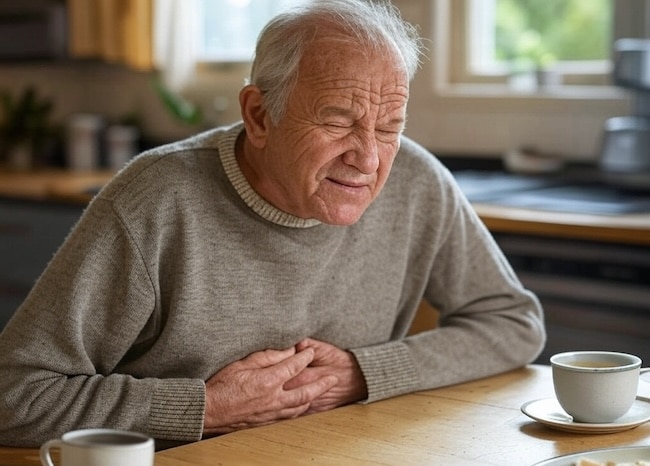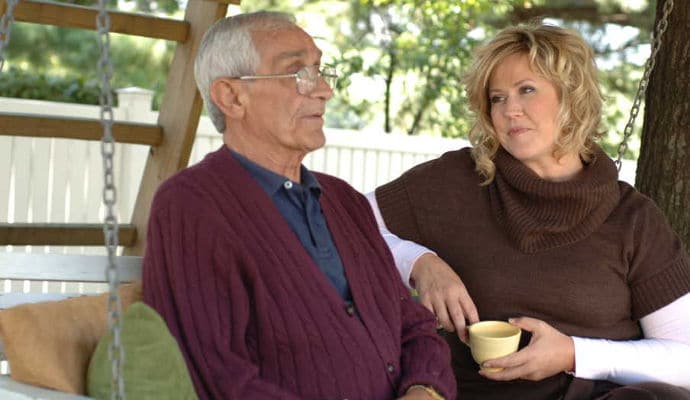As a caregiver, you diligently focus on meals and medications, but there's a silent danger that often goes unnoticed: dehydration. For older adults, the risk is alarmingly high because the natural sense of thirst diminishes with age, meaning your loved one might not feel thirsty even when their body desperately needs fluids.
Dehydration in seniors is far more than just feeling parched; it can quickly lead to confusion, dangerous falls, and hospitalization. Understanding why this happens and how to prevent it is one of the most powerful and straightforward steps you can take to safeguard your loved one's health and independence.

Dehydration is Dangerous for Aging Adults
Drinking enough water is essential for everyone, especially older adults, who are at greater risk of dehydration.
A UCLA study found that 40% of seniors may be chronically under-hydrated.
That can easily lead to dehydration and cause a variety of serious health problems, including urinary tract infections (UTI), falls, kidney stones, and more.
And, adults age 65 and up have the highest hospital admission rates for dehydration.
To help keep an older adult healthy and safe, we explain why dehydration is common in seniors, the symptoms of mild and severe dehydration, the health risks of dehydration, how much water a person needs, and the benefits of staying hydrated.
Why is Dehydration So Common Among Seniors?
Older adults are more likely to become dehydrated because they naturally have less water in their bodies.
They’re also likely to have health conditions or take medications that increase their risk of dehydration, such as blood pressure medications that cause water loss.
In addition, seniors:
- Are less sensitive to the feeling of being thirsty
- Have a decreased ability to keep fluid levels in balance in the body
- Have less efficient kidneys, which causes urine to contain more water
- Often take medications that cause side effects like diarrhea or excessive sweating
Symptoms of Dehydration in Seniors
Early dehydration symptoms in older adults often go unrecognized because many of the signs of mild dehydration could easily be caused by other health conditions or medication side effects.
But it’s far easier to correct mild dehydration than deal with the complications of severe dehydration symptoms.
Being familiar with the signs helps you take action sooner rather than later.
Mild dehydration symptoms
- Dry mouth
- Dark-colored urine or a minimal amount of urine
- Fatigue
- Dizziness
- Muscle cramps in the limbs
- Headaches
- Feeling weak or unwell
- Being sleepy or irritable
Serious dehydration symptoms
- Low blood pressure
- Confusion
- Difficulty walking
- Fast, but weak pulse
- Bloated stomach
- Wrinkled skin with no elasticity – try the “pinch test”
- Dry and sunken eyes
- Breathing faster than normal
- Severe cramping and muscle contractions in the body
- Convulsions
VIDEO: Is Your Loved One Dehydrated?
Health Risks of Dehydration
For seniors, staying well-hydrated is essential for many medications to work properly.
Dehydration can also cause serious health problems, including:
- Heat stroke
- Fainting or passing out
- Urinary tract infections
- Kidney stones and kidney failure
- Seizures
- Blood clot complications
- Hypovolemic shock – when low blood volume causes a drop in blood pressure and a drop in the amount of oxygen in the body
How Much Water Do Seniors Need?
For the average person, a general rule of thumb for how much water to drink each day is to take one-third of the person’s body weight in pounds and drink that number of ounces of water.
For example, a 150-pound person would need 50 ounces of water per day, which is about six 8-ounce glasses.
Of course, if the weather is very hot or dry, they’d need to compensate by drinking more water than usual.
However, because each older adult takes different medications and has various health conditions, it’s essential to consult their doctor to determine the appropriate water intake.
Benefits of Drinking Enough Water
Aside from avoiding serious health problems, staying well hydrated has additional benefits.
Drinking enough water means:
- Less constipation / reduced need for laxatives
- Fewer falls
- Reduced risk of urinary tract infection
- Men may have a reduced risk of bladder cancer
- Reduced risk of colorectal cancer
Final Thoughts on Dehydration in Aging Adults
Staying hydrated is one of the most straightforward yet powerful preventive measures for older adults. By understanding the unique risks, recognizing the often-missed signs, and implementing these practical daily strategies, you can create a powerful shield against the serious consequences of dehydration.
Making hydration a consistent, supported part of the daily routine is a powerful way to protect your loved one’s kidney function, cognitive sharpness, physical stability, and overall vitality. Let this knowledge empower you to turn concern into action, ensuring that every sip contributes to a safer, healthier, and more vibrant life.
Recommended for you:
- 6 Ideas to Get Seniors to Drink More Water
- 5 Ways Caregiving Routines Make Daily Life Easier
- 8 Tips to Avoid Harmful Drug Reactions and Overmedication in Seniors
About the Author

Connie is the founder of DailyCaring.com and was a hands-on caregiver for her grandmother for 20 years. (Grandma made it to 101 years old!) She knows how challenging, overwhelming, and all-consuming caring for an older adult can be. She also understands the importance of support, especially in the form of practical solutions, valuable resources, and self-care tips.














My mom experienced a dangerous low sodium event from drinking too much water. Just a cautionary tale.
Very good articles!
Thanks! So glad they’re helpful.